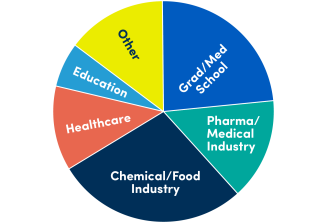Careers in Chemistry

Where can a chemistry degree take you?
From solving crimes in forensic labs to designing lifesaving medicines to creating cleaner energy, chemists are behind some of the most important breakthroughs of our time. And UB Chemistry grads are right in the middle of it—working in labs, hospitals, boardrooms and beyond.
Chemists don’t just wear lab coats and mix solutions (though we do that too). They apply science to solve real problems, across industries like:
- Pharmaceuticals: Developing new drugs and treatments
- Environmental Science: Protecting our air, soil and water
- NASA + Aerospace: Designing materials for space missions
- Law and Policy: Advising on patents, sustainability and regulations
- Research + Development: From food safety to electronics
- Biotech + Medicine: Understanding and fighting disease at the molecular level
No matter where they work, chemists make things better. They improve health, protect the planet and help shape how we live.
- Research Chemist: Synthesizes and analyzes materials for everything from electronics to cosmetics.
- Process Chemist: Figures out how to safely scale up chemical production for industries around the world.
- Environmental Chemist: Studies pollution and creates solutions for cleaner air, soil and water.
- Organic Chemist: Works with carbon-based compounds to improve medicine, energy and materials.
- Biochemist: Explores how chemistry drives life processes—key to new health breakthroughs.
- Forensic Chemist: Partners with law enforcement to solve crimes through chemical analysis.
Career Placement of UB Chemistry Graduates (2019–2024)
Our grads go far—and wide. You’ll find UB Chemistry alumni in roles across the country and the world, including:
- National labs like the EPA, NIH and NASA
- Major corporations in energy, pharma and advanced tech
- Hospitals and healthcare systems
- Environmental nonprofits and policy groups
- Law firms and public agencies
- Classrooms, research institutes and universities
The Career Design Center helps you explore options, build practical skills and take action on your goals. Whether you are just starting to think about what comes next or actively preparing for jobs or graduate school, you will find clear guidance and real opportunities to move forward.
What you can do at the Career Design Center:
- Meet one-on-one with a career design consultant
- Get support with job and internship searches and grad school planning
- Use online tools for resumes, interviews, networking and exploring real-world challenges
- Attend job + Internship fairs, skillshops and networking events
- Gain access to thousands of jobs + internship postings on Bullseye powered by Handshake.
- Explore the Career Design Studio any time to discover tools, resources and ideas that help you plan your path.
Another career resource
American Chemical Society: Chemistry career insights

